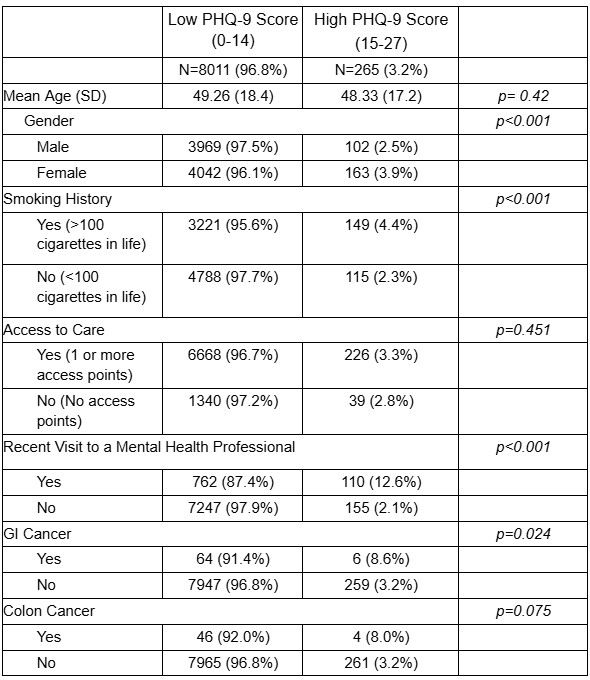Sunday Poster Session
Category: Colorectal Cancer Prevention
P0487 - Association Between Gastrointestinal Cancer and Depression: A Population-Based Cohort Study
Sunday, October 26, 2025
3:30 PM - 7:00 PM PDT
Location: Exhibit Hall
- BP
Bishal Paudel, MD
University of Florida
Gainesville, FL
Presenting Author(s)
Bishal Paudel, MD1, Ahmed Al Qady, MD1, Dewan Giri, MBBS2
1University of Florida, Gainesville, FL; 2University of Florida Health Shands Hospital, Gainesville, FL
Introduction: Gastrointestinal malignancies pose significant physical, mental and psychological challenges to patients. While we know that patients with recent diagnosis of cancer struggle with mental health, the data looking at the relationship between gastrointestinal cancer (GICa), specifically colon cancer (CCa), and depression is sparse. In this study, we aim to assess the relationship between GICa/CCa and depression.
Methods: 8,276 adult individuals who participated in the National Health and Nutrition Examination Survey (NHANES) from 2017-2020 and completed the Patient Health Questionnaire-9 (PHQ-9) were included in the study. Our study population was divided into a low PHQ-9 score category (0-14) and a high PHQ-9 score category (15-27). Variables including age, gender, smoking history, access to care, recent visit to a mental health professional, diagnosis of GICa (includes colon/esophagus/liver/rectal/stomach/gallbladder/pancreas) and specifically CCa were analyzed to assess relationships with PHQ-9 scores using univariate analysis. Significant variables were then used in a multinomial logistic regression model to further identify the significance of the relationship between depression and GICa diagnosis.
Results: In our study, 3.2% (n=265) of participants had high PHQ-9 scores, and 96.8% (n=8011) had low scores. 8% of patients with CCa had high PHQ-9 scores compared to 3.2% of patients without CCa (p=0.75). Patients with a diagnosis of GICa had significantly higher PHQ-9 scores compared to patients without GICa (8.6% vs 3.2%, p=0.024). Variables such as gender, smoking history, and recent visit to a mental health professional were all significantly associated with high PHQ-9 scores in the univariate analysis (p< 0.05). After performing a multinomial logistic regression analysis model, diagnosis of GICa was still significantly associated with high PHQ-9 score (p=0.044).
Discussion: Our study demonstrated that there is an association between diagnosis of GICa and depression. PHQ-9 score of 15 or more correlates to moderately severe and severe depression that warrants active treatment. Clinicians should provide patients with resources to help with their mental health when encountering a new diagnosis of GICa.

Figure: Table A: Univariate Analysis of Risk Factors for Depression
Disclosures:
Bishal Paudel indicated no relevant financial relationships.
Ahmed Al Qady indicated no relevant financial relationships.
Dewan Giri indicated no relevant financial relationships.
Bishal Paudel, MD1, Ahmed Al Qady, MD1, Dewan Giri, MBBS2. P0487 - Association Between Gastrointestinal Cancer and Depression: A Population-Based Cohort Study, ACG 2025 Annual Scientific Meeting Abstracts. Phoenix, AZ: American College of Gastroenterology.
1University of Florida, Gainesville, FL; 2University of Florida Health Shands Hospital, Gainesville, FL
Introduction: Gastrointestinal malignancies pose significant physical, mental and psychological challenges to patients. While we know that patients with recent diagnosis of cancer struggle with mental health, the data looking at the relationship between gastrointestinal cancer (GICa), specifically colon cancer (CCa), and depression is sparse. In this study, we aim to assess the relationship between GICa/CCa and depression.
Methods: 8,276 adult individuals who participated in the National Health and Nutrition Examination Survey (NHANES) from 2017-2020 and completed the Patient Health Questionnaire-9 (PHQ-9) were included in the study. Our study population was divided into a low PHQ-9 score category (0-14) and a high PHQ-9 score category (15-27). Variables including age, gender, smoking history, access to care, recent visit to a mental health professional, diagnosis of GICa (includes colon/esophagus/liver/rectal/stomach/gallbladder/pancreas) and specifically CCa were analyzed to assess relationships with PHQ-9 scores using univariate analysis. Significant variables were then used in a multinomial logistic regression model to further identify the significance of the relationship between depression and GICa diagnosis.
Results: In our study, 3.2% (n=265) of participants had high PHQ-9 scores, and 96.8% (n=8011) had low scores. 8% of patients with CCa had high PHQ-9 scores compared to 3.2% of patients without CCa (p=0.75). Patients with a diagnosis of GICa had significantly higher PHQ-9 scores compared to patients without GICa (8.6% vs 3.2%, p=0.024). Variables such as gender, smoking history, and recent visit to a mental health professional were all significantly associated with high PHQ-9 scores in the univariate analysis (p< 0.05). After performing a multinomial logistic regression analysis model, diagnosis of GICa was still significantly associated with high PHQ-9 score (p=0.044).
Discussion: Our study demonstrated that there is an association between diagnosis of GICa and depression. PHQ-9 score of 15 or more correlates to moderately severe and severe depression that warrants active treatment. Clinicians should provide patients with resources to help with their mental health when encountering a new diagnosis of GICa.

Figure: Table A: Univariate Analysis of Risk Factors for Depression
Disclosures:
Bishal Paudel indicated no relevant financial relationships.
Ahmed Al Qady indicated no relevant financial relationships.
Dewan Giri indicated no relevant financial relationships.
Bishal Paudel, MD1, Ahmed Al Qady, MD1, Dewan Giri, MBBS2. P0487 - Association Between Gastrointestinal Cancer and Depression: A Population-Based Cohort Study, ACG 2025 Annual Scientific Meeting Abstracts. Phoenix, AZ: American College of Gastroenterology.
